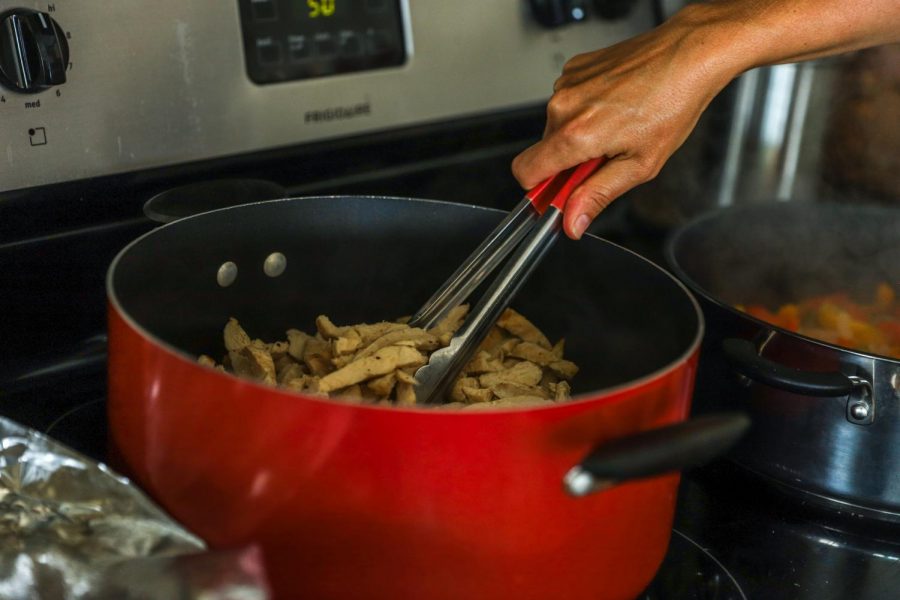Managing cooking in college
Kaycee Orwig | Assistant Visual Editor
While college dorms and apartments are notoriously small, students can still manage to eat healthy and diverse meals without the luxury of a fully equipped cooking space.
August 16, 2020
This semester, don’t let the small space of a dorm or an apartment limit you from creating big things in the kitchen.
While college dorms and apartments are notoriously small, students can still manage to eat healthy and diverse meals without the luxury of a fully equipped cooking space — they just need to learn how.
According to Laura Kleiber, a Pittsburgh-based registered dietician and 2019 Pitt alumna, some students struggle with making good meals in college because of the stark adjustment from home life to dorm life.
“College is the first time that a lot of people are out on their own and in charge of making meals for themselves for the first time,” Kleiber said. “A lot of kids that age can struggle with going out and buying groceries and figuring out what they should have for dinner every day.”
Although it can be an overwhelming transition at first, Kleiber said students can still manage to cook healthy meals in a small apartment or dorm kitchen.
“As a college student, you’re probably living in a dorm with a shared kitchen or a small kitchenette,” Kleiber said. “There’s definitely limited options, but that doesn’t necessarily mean that you need to be unhealthy.”
For any student, the first step for efficient cooking is getting the right appliances. Besides the standard minifridge and microwave, Kleiber also recommended a miniblender. Depending on where you live, she also recommended investing in a slow cooker, a toaster oven and a meat thermometer for more advanced meals.
But before cooking, you’re going to need ingredients. Kleiber recommends going to the store with a grocery list to save both time and money.
“Go grocery shopping with a list and stick to it,” Kleiber said. “If you are doing meal planning, you will know exactly what you need to grab, so it will be helpful for your wallet and also be helpful with your food waste.”
When it comes to cooking meals, planning your meals in advance is the best way to go in college, according to Kleiber.
“That doesn’t necessarily mean that you need to eat the same thing every single night,” Kleiber said. “Think about something that you can make for dinner in advance when you know you’re going to be tired and hungry after class or practice.”
Kleiber recommended cooking staple foods such as veggies, starches and proteins in batches and then eating them in different ways throughout the week. She suggested repurposing chicken in wraps, tacos or as a main meal with a side of veggies.
“There are so many possibilities when you have things cooked and portioned out already,” Kleiber said. “My rule is ‘cook once and eat twice’ — when you batch-cook food and divide it up, it’s super easy and you don’t have to eat the same thing everyday.”
Kleiber noted that when cooking most proteins, such as poultry and beef, you should check the temperature with a meat thermometer to ensure that the meat is cooked thoroughly. She also recommended eating meat within seven days of cooking it and takeout leftovers within 48 hours to ensure freshness and food safety.
Although batch-cooking can require some sort of oven or stove, students with only a microwave can find ways to cook meals as well. Emma Porter, a rising sophomore biology and psychology double major, swore by the Fasta Pasta, a Tupperware-like container that allows her to cook pasta quickly in her microwave for an easy dinner.
“I bought the Fasta Pasta and it was the best investment I’ve ever made,” Porter said.
“I used my meal plan to buy uncooked pasta and spaghetti sauce from the [Forbes Street Market], and then I could cook any type of noodle I wanted in my dorm.”
Once she cooked her pasta, Porter used Pyrex containers for leftovers. She said this way, if she made too much food, she could always reheat it another day or bring some with her on the go.
Archisha Ghosh, a rising sophomore molecular biology major, also had tips for students in small dorms. She recommended always keeping snacks around, such as dried fruit and nuts, so you don’t have to leave your room everytime you want something to eat.
She also advised eating a quick microwave meal, such as instant oatmeal, for something hot and simple in the morning. According to Ghosh, a mug cake is also a great way to celebrate a birthday without the hassle of baking something yourself.
“On my roommate’s birthday, I just bought her a mug cake and popped it in the microwave for her,” Ghosh said. “It honestly turned out pretty good and it was really easy.”
Ghosh also suggested that students pack appliances and utensils lightly, especially if they are living somewhere very small like Litchfield Towers.
“There’s not much you can do or much you can cook, so you just need to bring the basic stuff to avoid overloading yourself and you’ll probably save some space that way too,” Ghosh said.
“I honestly think that you can do a lot with just a plain bowl or plate.”



